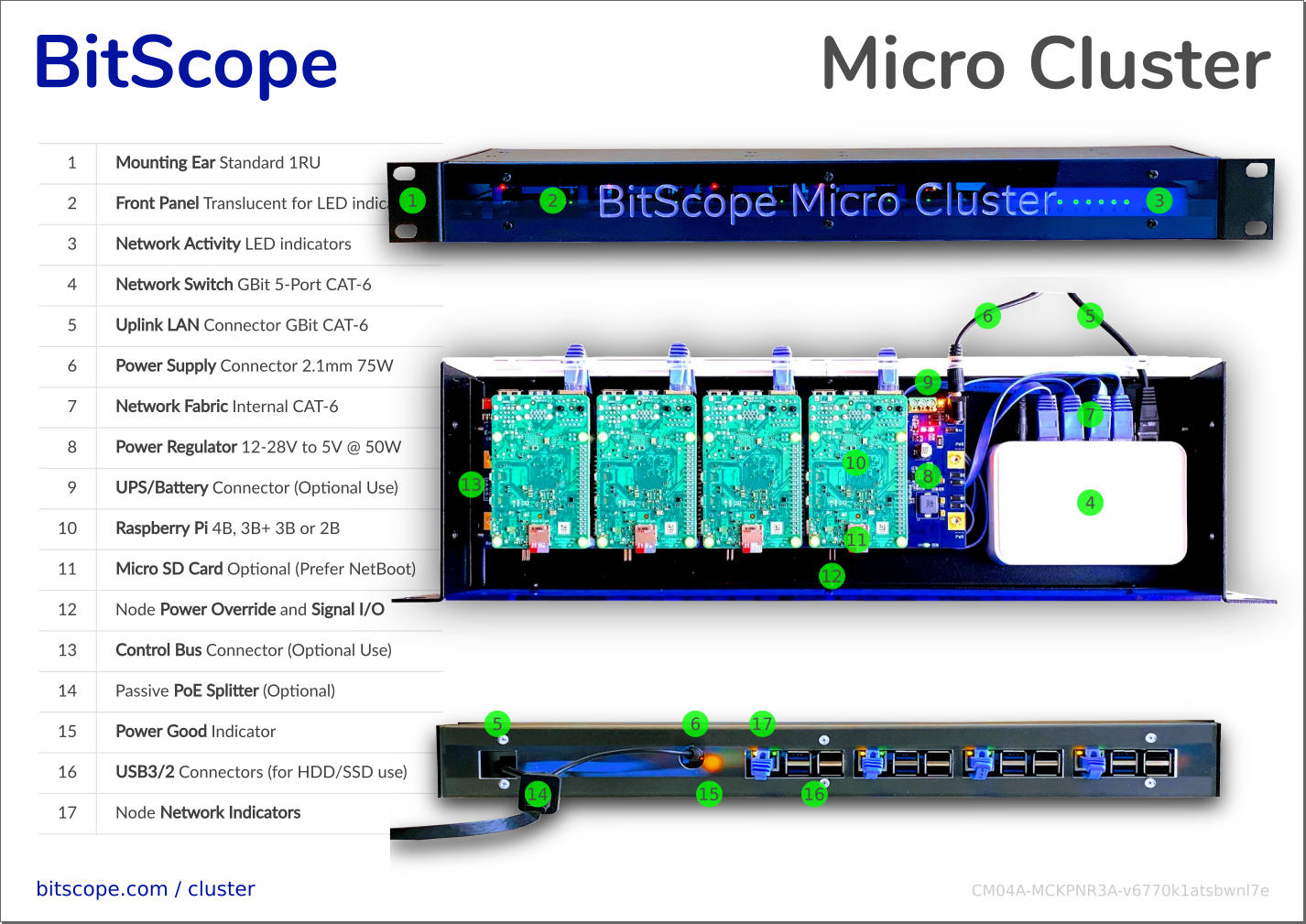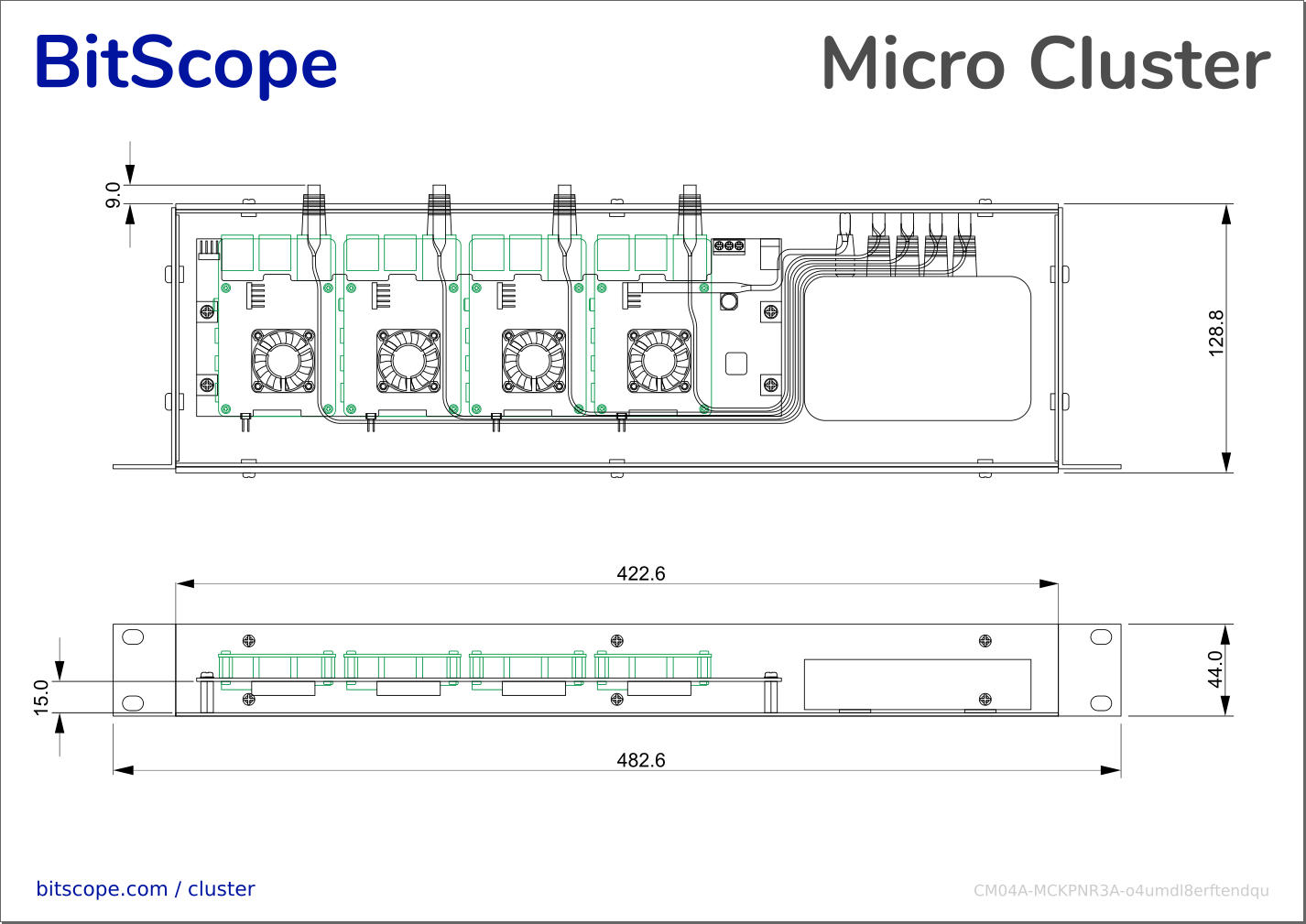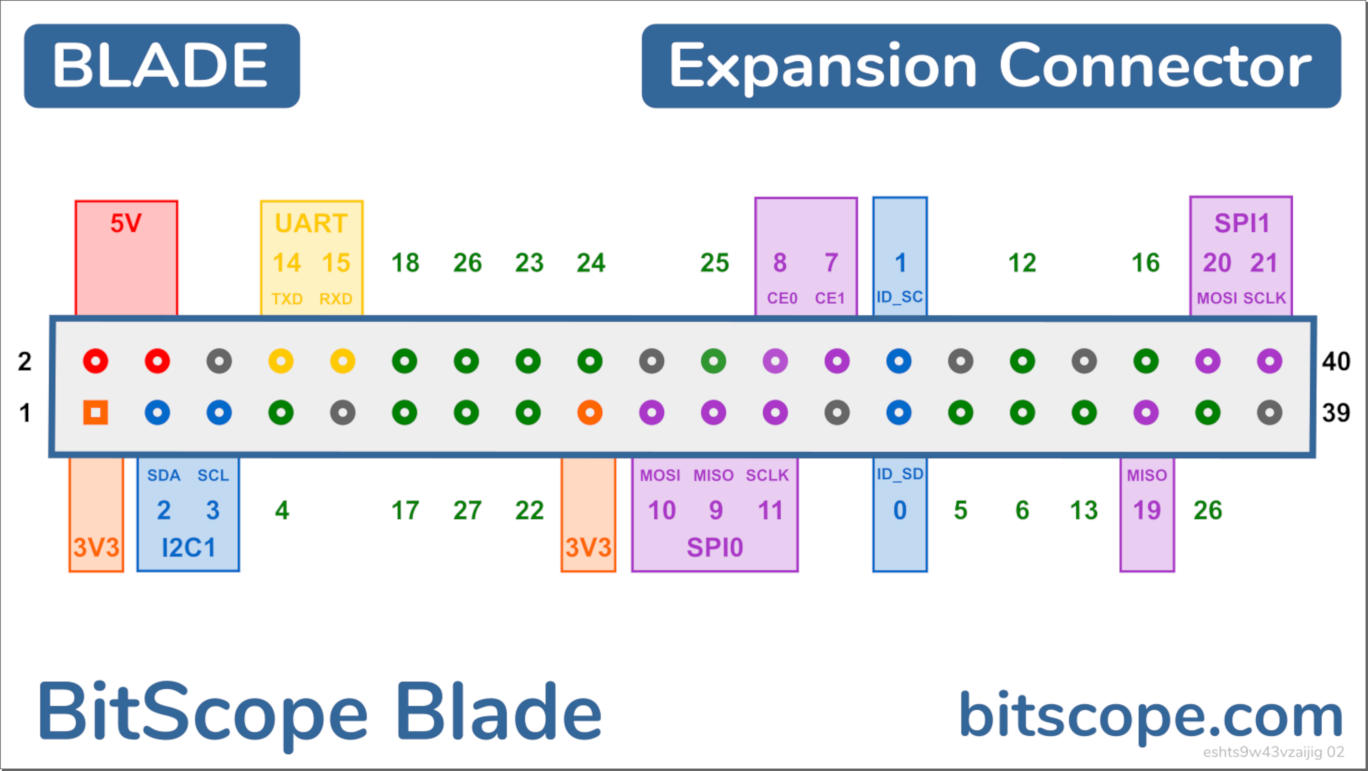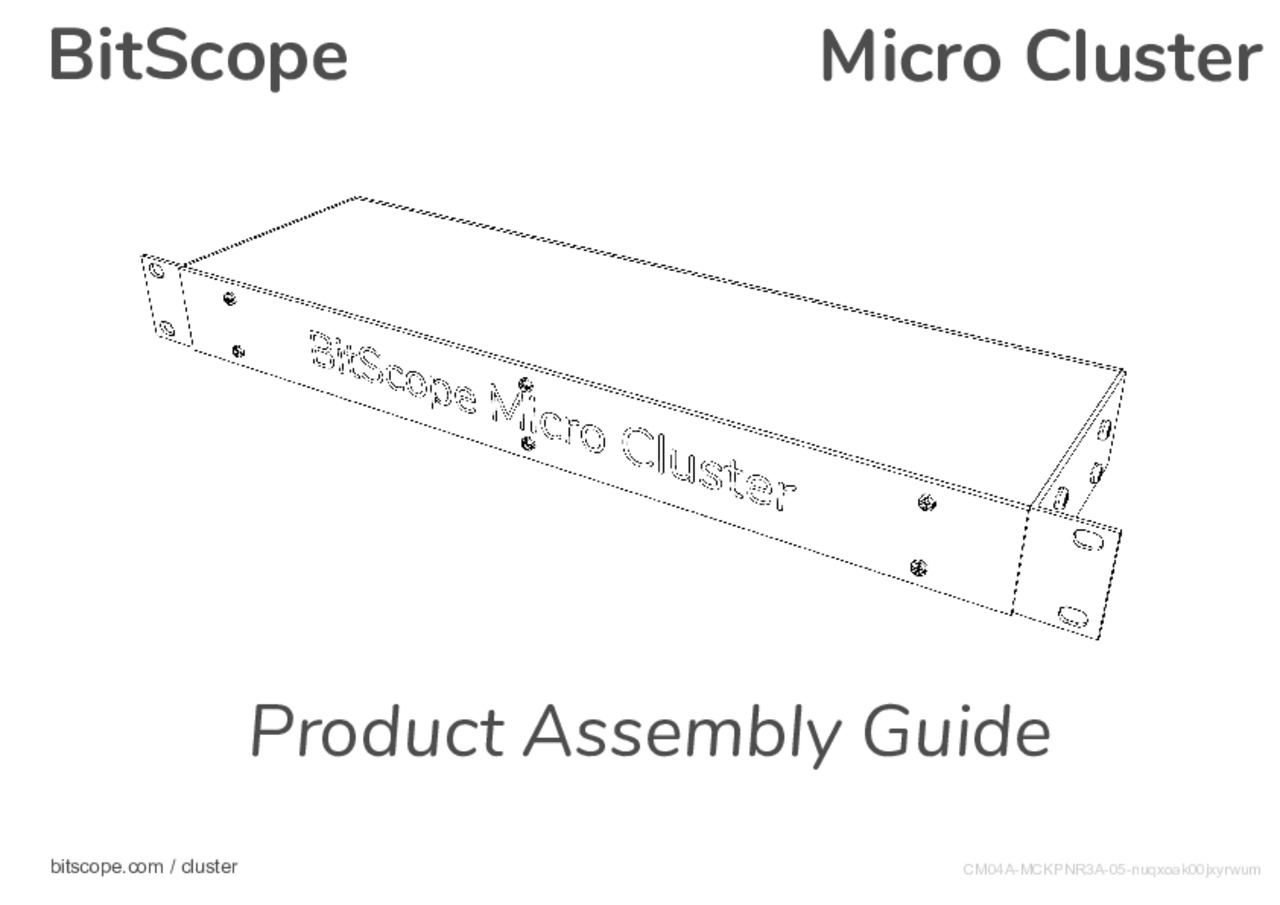BitScope Micro Cluster
Table of Contents
BitScope's Compact Turn-Key Raspberry Pi Cluster.

BitScope Micro Cluster is our smallest managed Raspberry Pi Cluster solution. Packaged in 1RU and based on Cluster Blade it simplifies the industrial deployment of Raspberry Pi Clusters.
About Micro Cluster
Micro Cluster is the smallest member of BitScope's Raspberry Pi Cluster Family.
It bundles network fabric and power distribution in a compact stand-alone rack-mount unit.
Based on Cluster Blade, Micro Cluster accepts 12V to 28V and regulates down to 5V at up to 50W providing stable power for the Raspberry Pi. At the rear, power is connected via a 2.1mm socket and a GBit CAT-6 socket provides network connectivity without the need for an external switch.
Micro Cluster includes active cooling, voltage, current and power monitoring, remote power control, full console access and diagnostic support. All USB ports are accessible at the rear for the connection of peripherals including USB3 Hard Disks or SSD Drives.
Any node can manage the cluster, from full power control to cooling profiles and out-of-band communications. This includes the ability to access each node via its system console (serial port) with root/kernel level access. It is even possible to manage each node down the firmware and bootloader level. Micro SD Cards are accessible at the front (by removing the front panel) but card free network or mass-storage boot is recommended (rendering the use of micro SD cards moot).
Micro Cluster Features
BitScope Micro Cluster offers these key features.
| ✔ Raspberry Pi 4B, 3B+, 3B, 2B or Zero. | ✔ BitScope Cluster Bus & Control Plane. |
| ✔ Accepts 12V~28V unregulated supply. | ✔ Node Power, Bootstrap & Shut-Down. |
| ✔ Provides 5V @ 50W (peak, regulated). | ✔ Power, Voltage & Current Monitoring. |
| ✔ Power Good and Node Load indicators. | ✔ Supports Passive PoE and Battery Backed UPS. |
| ✔ Active Cooling System (Programmable). | ✔ Use stand-alone or to build large clusters. |
| ✔ Integrated GBit Network Fabric | ✔ Supports HAT and USB devices including SSD. |
Peripheral Connections
All Raspberry Pi USB Ports and LAN connectors are exposed at the rear of the unit.

When configured with the internal switch, the LAN ports have internal network cables attached (as shown here). Alternatively, when using an external switch, the network cables may be attached to each node individually. In both cases, the USB ports (a pair of USB3 and USB2 for each node using Raspberry Pi 4B) are accessible for the connection of up to four USB devices per node. The most common devices to connect this way are SSD or HDD mass storage devices. Micro Cluster provides up to 500mA per USB port (per the Raspberry Pi Specification) across all four ports on each node subject to a total power budget of 50W for the entire cluster.
Expansion Hardware
In addition to the LAN and USB ports, the Raspberry Pi HAT connector is available on every node.
The HAT connectors are accessible underneath each node when assembled in the standard way. This may not be convenient or provide enough space depending on the type of expansion hardware being used. To address this, the cluster can be assembled with the Cluster Blade mounted upside down exposing the HAT connectors at the top. For example, here is an open cluster module with four different HATs (both standard size and larger non-standard sizes) connected:

Expansion kits for Micro Cluster are available upon request to extend the cluster size to 2RU and make room for larger HAT hardware in an enclosed unit with custom I/O panels for the front or rear of the unit. Ask us for details.
Technical Specifications

| Compatiblity | Raspberry Pi 4B, 3B+, 3B & 2B Any Raspberry Pi that conforms to the HAT specification is compatible. |
| Nodes per Module | 4 |
| Network Switch | 4-Port GBit + 1-Port GBit Uplink Integrated cluster switch implementing the internal network fabric and external uplink connections (optional). |
| Cluster Power Budget | 50W (9A continuous 10A peak) Peak and continous current available at 5V across all slots and connected peripheral devices. |
| USB Ports | 8 x USB3 + 8 x USB2 (Pi 4B) Refers to the number of USB and Network ports (provided by connected Raspberry Pi) |
| Network Ports | 4 (no switch) or 1 (with switch) |
| HDD/SSD Support | ✔ M.2 and/or external USB3 connected HDD and SSD supported with up to 500mA available per connected drive. |
| HAT Device Support | ✔ Number of connectable Raspberry Pi compatible HAT devices (subject to power budget). |
| Active Cooling System | ✔ Provides mounting and control for 30mm cooling fans (per node) with programmable control. |
| Built-in Control Plane | ✔ Built-in control bus for full control plane functionality on-board. |
| BitScope I/O System API | ✔ Uses the BitScope Input/Output System (BIOS) API (an ASCII based script programmable VM). |
| Geographic Node Addressing | ✔ Default node address is built into the Blade (no configuration required). |
| Voltage, Current & Power Monitor | ✔ Each slot may be individually powered up/down via this header (normally powered up). |
| Node UUID, SRAM & FLASH | ✔ Built-in UUID per node with off-node SRAM and FLASH programmable configuration memory. |
| Voltage, Current & Power | ✔ Built-in BitScope Measurement functions for supply voltage, board and node current and power. |
| Message Passing System | ✔ Mailbox based out-of-band synchronisation and message passing system for node control. |
| Remote Diagnostics Support | ✔ Support for access to serial terminal based diagnostics on each node in managed clusters. |
| Reversable Power Inputs | ✔ (optional) Supports either polarity for tab connected power when building ad-hoc clusters. |
| Redundant Power Support | ✔ (optional) Supports the use of dual (redundant) power supplies with bridge rectified failover and continous operation. |
| Soft-Knee Power Control | ✔ Control bus power-on enable is "soft turn-on" ensuring reliable cross-cluster power management. |
| Short Circuit Protection | ✔ A short-circuit produces graceful board level shut-down not overheating or board failure. |
| SLA/UPS Support | ✔ Blocking diode enables use with UPS and battery backup power solutions. |
| HAT Power | 5V via J8 Primary power for connected Raspberry Pi and HAT devices. |
| Auxilliary Power | 4 x 5V Auxilliary power for devices connected via 3-pin power headers (e.g. Raspberry Pi Display) |
| Indicator LEDs | Reset / Interrupt LEDs to indicate BAY reset and interrupt inputs. |
| Processor reset/interrupt | ✔ The device in each slot may be individually reset or interrupted via this header. |
| SPI, I2C, Serial & GPIO | ✔ Access to each Raspberry Pi GPIO, SPI, I2C and Serial signals. |
| 19" Rack Compatible | 1RU Blades can be rack mounted to create cluster computing solutions with optional metalwork. |
| DC 2.1mm, PoE Compatible | ✔ DC 2.1mm power socket compatible with low cost passive PoE solutions DC 2.1mm power socket compatible with low cost passive PoE solutions.. |
| Power Requirement | 12V (6A) ~ 28 V (2.5A) |
| Operating Temperature | 0 °C to 70 °C |
| Storage Requirements | -40 °C ~ +40 °C, 5 % ~ 95 % RH |
| Dimensions (W x D x H) | 200 x 80 x 180 mm |
| Weight | 1300 g |
Cluster Blade
Micro Cluster is built with Cluster Blade.
Cluster Blade replaces Blade Quattro (comparison) and is recommended for new designs.
MC4FFBD7 |
BitScope Micro Cluster |
|---|---|
| Link | docs.bitscope.com/micro-cluster |
| Author | BitScope Products <products@bitscope.com> |
| Copyright | © 2022 MetaChip Pty. Ltd. T/A BitScope Designs. All Rights Reserved. |
| License | Attribution-NonCommercial-NoDerivatives 4.0 International (CC BY-NC-ND 4.0) |
| Feedback | We welcome your feedback. If you find any errors, omissions or just information that is confusing or incorrect, please email us at feedback@bitscope.com with details. |
| Date | |
| Rev | oudacuczehzc83yz |
| Purchase | https://bitscope.com/buy/cluster (not yet active) |
| Enquiries | BitScope Sales <sales@bitscope.com> |





